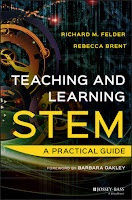The clear organization of the text makes it easy to envision starting with small changes in one's class and leading up, over time, to more complex changes that include project or problem based learning. Some of the things I learned are
- in learning objectives do not use the verbs know, learn, understand, or appreciate as you cannot truly measure what your students are accomplishing
- if you need your students to know material that is primarily memory-based (vocabulary, terminology, definitions, facts, periodic table), give them handouts and set the expectation
- when addressing cheating in class, remind students that this may say something about their future life, their future work ethics
- distinction between active and reflective learner - though the example given does not convince me (active learner = just tries without thinking, reflective learner = will work carefully through exercises)
- the strategy of TAPPS - thinking aloud pair problem solving with the two roles of explainer and questioner
- the strategy of Pair Programming with the two roles of navigator and pilot
- flipped flipping
- learning approaches of deep, surface, and strategic
- designing an exam with 10-20% of high level objectives - no more, no less
- giving students strategies to become experts through problem classification, metacognition, automacity of certain tasks, self-efficacy
- the McMaster problem solving structure of define, explore, plan, implement, reflect
- the Perry model of intellectual development: dualism, multiplicity, relativism
- in-class clinics for group work
The reminders throughout the book were just as useful.

No comments:
Post a Comment